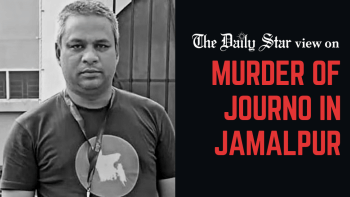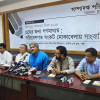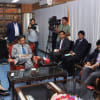End impunity for killing journalists

Two back-to-back incidents in recent weeks have perfectly epitomised the two gravest challenges confronting journalists today: their lack of safety and the lack of consequence for any harm inflicted upon them. The first incident saw a journalist brutally murdered in Jamalpur, while the second saw the deadline for submitting a probe report in the Sagar-Runi murder case deferred for an unbelievable 101st time. These incidents not only highlight the perils faced by journalists but also the urgent need for comprehensive measures to ensure that those responsible for silencing them are held accountable.
Unfortunately, far from remedying the situation, the authorities have repeatedly dismissed concerns raised by activists. One of the major concerns is the unsolved killings of journalists. As per a report by Prothom Alo, 30 journalists have been killed in the last 15 years, with the families of victims yet to see justice in most cases due to delayed investigations or trials. While the Sagar-Runi case is perhaps the most protracted one, there are other long-running cases lost equally in the judicial maze. Meanwhile, many of the accused – with known affiliations with the ruling Awami League – are out on bail. Imagine the plight of families who have been left without justice, or closure, or any state protection from the potential threat posed by the accused. One of them is the 80-year-old mother of slain journalist Julhas Uddin, who says she is unsure if she will see justice before her death. Many are not even convinced about the fairness of the investigative/trial processes.
All this paints a deeply troubling picture of the media landscape in Bangladesh, which emerged as the eleventh worst country for unsolved killings of journalists in the CPJ's 2021 Global Impunity Index. It is largely because of this questionable legal response that the country is becoming a haven for anti-journalist criminal elements. According to the Ain o Salish Kendra (ASK), from 2008 to May 2023, there have been some 3,641 incidents of harassment and torture of journalists, with 682 of them recorded in the last three years. The extent of dangers facing journalists is truly alarming. And the addition of repressive tools like the Digital Security Act (DSA) have only made things worse.
We urge the authorities to take a long, hard look at this state of affairs. They must allow journalists to do their job with total freedom and without any threat of physical, psychological or reputational harm hanging over their heads. And they must ensure that the killers of journalists and their political backers are brought to justice.


 For all latest news, follow The Daily Star's Google News channel.
For all latest news, follow The Daily Star's Google News channel. 










Comments